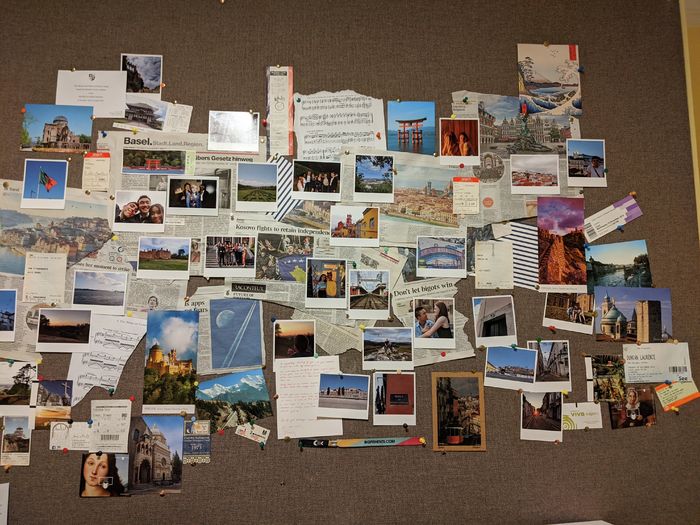Home is where my name is
Revealing the connections between language, home and history, Conchubhar Dáire Mac Cana discusses non-binary identity in Britain and Ireland
When I was born, my name was anglicised “to make life easier.” My parents, after all, had grown up in a state which treated our cultural expressions with hostility and suspicion. Aside from national identity, the community in which I was raised tended to treat most divergences from the norm with a kind of obsessive desire to cleanse and erase whatever threatened their comforts: men are men, no man ever loves a man; make art and be useless; God is kind and justifies us. Many of the same sentiments were imposed upon me by people who had experienced, to some extent, the threat of oppression. My name, anglicised to adhere to colonial normality, rang out from pious mouths which demanded I conform to things unreasoned and unjustified, things which were themselves impositions of a colonial history of gender conventions and sexuality.
With university came the chance to remove my parochial traumas. Many have, to varying degrees, fled the backwardness of their villages and towns and cities in the fresh, new haven of somewhere unknown. Yet, to address simple questions is to return continuously backward.
Traditional Fresher’s talk: ‘Where are you from?’
Ever the distinction to be made, ever the decision: Which terms will I use? How will I situate myself properly?
“I brought about a new kind of home where I could be more myself, divorced from Ireland’s shoreline but linked to its consciousness.”
I am from the ‘north of Ireland’ which, to anyone who knows, has just indicated my allegiances, my ‘ethnicity’, my politics, my cultural background and my religion. There are, of course, variations among those who might choose to identify ‘Northern Ireland’ as I have. But, for the most part, the supposed indications of background offered by the shibboleth are probably true. I don’t mind so much. It was never really my intention to flee from my home, or lie about my truths, or use Cambridge as a means through which to flee from the traumas of provincial narrow-mindedness. I am too stubborn, and too dedicated, to give into the shame some of us feel when we hear our own accents abroad or on TV, or when we cast our minds over the backwardness that has traumatised us.
And even so, had I wanted to flee the oppressive cultures of my homeplace, I would’ve had to interpret and express my identity through a language which carries with it the baggage of famines and war and colonialism. Where I might be expected to express myself, I could not use words which were lent all their further associations by the wider anglosphere, the embarrassment which accompanies the politics of their use: man/woman, he/him, they/them, she/her.
In the frightening wake of a discourse which encourages an internalised fear of what you are or what you might be, I couldn’t bring myself to dedicate what I was into language. Too many jibes and jokes, too many derisions, too much internalised self-hatred to stomach the vulnerability that would ensue. But as I developed my relationship away from home, with the language of my homeland, I discovered a means through which to express myself, one where, as a famous ‘local’ poet puts it, ‘language would not simply be a badge of ethnicity or a matter of cultural preference or an official imposition, but an entry into further language.’
The gender-neutral pronouns in Irish are siad/iad. I am so much more comfortably non-binary in Irish than I am in English. By reclaiming the spelling of my name, by removing the anglicisation, I could start anew and form an identity for myself which is, at the very least, reaching for a more confident truth. In leaving my home, I paradoxically discovered freedom from its traumas by returning to my native tongue. By doing so, I brought about a new kind of home where I could be more myself, divorced from Ireland’s shoreline but linked to its consciousness.
But I’m ‘home’ now, much more literally. I feel trapped by quarantine and, admittedly, in the eyes of those around me. They don’t understand so much of my experience. Every day comes with it a fresh box in which to cram myself. The English language we use in the house keeps me curtained. It is painful to be ‘home’ and yet away from ‘home’. There are those ‘local’ places I know I am understood, of course, but they are inaccessible now. ‘Home’ has become an unusual place I carry with me, ‘home’ is where my name is; and yet not where I am.
Lockdown has reminded me of so much, and how far I’ve come since then. I still, undoubtedly, have much to experience and explore. For now, I am comfortable teaching myself my native language and seeing where the confluences take me. I have opened the door into my world, and nothing is hidden now.
 News / Eight Cambridge researchers awarded €17m in ERC research grants27 December 2025
News / Eight Cambridge researchers awarded €17m in ERC research grants27 December 2025 News / Clare Hall spent over £500k opposing busway 24 December 2025
News / Clare Hall spent over £500k opposing busway 24 December 2025 Comment / League tables do more harm than good26 December 2025
Comment / League tables do more harm than good26 December 2025 Comment / The ‘class’ of Cambridge24 December 2025
Comment / The ‘class’ of Cambridge24 December 2025 News / Caius mourns its tree-mendous loss23 December 2025
News / Caius mourns its tree-mendous loss23 December 2025










